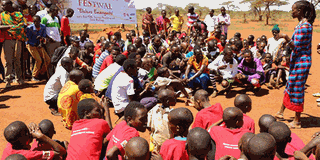Lockdown, curfew curtail FGM prevalence

Selina Nkoile a grassroots activist against child marriage and FGM addresses young Masaai villagers on the negative impact of FGM. Cases of the vice have declined during the Covid-19 pandemic season. PHOTO | POOL | NATION MEDIA GROUP
What you need to know:
- Vice has taken a nosedive owing to robust government machinery put in place to check on the outlawed practice
- Only one case reported in Samburu
- Public urged to ensure girls are safe, and to report suspected activities
- Cases of rape have increased significantly
- Pandemic has magnified structural violence and inequalities
The government’s move to impose a dusk-to-dawn curfew to curb the spread of corona virus sparked fears of a spike Female Genital Mutilation (FGM) cases.
Recent reports from the Anti-FGM indicate that the vice has taken a nosedive owing to the robust government machinery put in place to check on the outlawed practice.
Board chief executive director Ms Bernadette Loloju said no case of FGM has been reported during this period especially in Elgeyo-Marakwet, Baringo, West Pokot and Kuria, areas mapped as FGM hotspots.
High alert
“We have only received reports of one case in Samburu. However, the situation is under control on the ground. Chiefs, administrative officials and religious leaders are on high alert to ensure the practice is completely abandoned,” she said.
Ms Loloju added that the board is working closely with the ministries of Interior, Education and Health to protect vulnerable girls who are home during this pandemic period.
In April, the board raised the red flag over the possibility of a rise in cases of FGM owing to the lockdown and curfew.
“We urge the public to ensure girls are safe and to report any case of suspected activities in their villages to the chief or police,” the board said in a statement.
The board further urged villagers to be vigilant to guarantee the safety of girls.
In a statement, Public Service, Gender and Youth Affairs Cabinet Secretary Prof Margaret Kobia vowed that the government will remain vigilant at this time the country is battling to contain Covid-19 spread to ensure girls are protected from the vice.
Helpline
She added that the government remains alive to the fact that women are relatively at a higher risk of suffering gender-based violence (GBV) particularly during the curfew period.
“We would like to assure you of continued government support during this period. Our toll free GBV helpline 1195 remains open for 24 hours a day. I urge Kenyans to report any GBV cases through the helpline for medical and any other assistance,” said Kobia.
According to the Kenya Demographic and Health Survey (KDHS), 2014 about 21 per cent of women and girls aged between 15-49 years in Kenya have undergone FGM.
And despite the national decline in the prevalence, the practice is still high in some communities like Somali at 94 per cent, Samburu 86 per cent, Kisii 84 per cent and Maasai 78 per cent.
According to ‘28 Too Many’, a values based charity working to end FGM in Africa, the vice has, however, reduced by 10 per cent in the last ten years.
To completely eradicate the illegal practice in Kenya by 2022, the government launched a National Policy on Abandonment of Female Genital Mutilation 2019 in November last year.
The State has now, through the policy, placed those subjected to and at risk of FGM, religious leaders, traditional justice systems in FGM practicing communities and stakeholders involved in Anti-FGM advocacy in the country at the center of the campaign to wipe out the menace.
Despite the low FGM cases in the country during this period, reports have indicated that the rate of Gender Based Violence (GBV) have increased in the past two months, with 115 cases reported to the GBV hotline in March compared to 86 cases in February.
Structural violence
Similarly, reports by the National Council on the Administration of Justice (NCAJ) show that cases of rape have also increased significantly in the two weeks following the national curfew, consisting of 35.8 per cent of all reported crimes.
As a result, women rights organisations have appealed to the government to set aside at least 30 per cent of the Covid-19 emergency response fund to address GBV prevention and response strategy in the country.
In a statement last week, the civil rights group raise concern that the pandemic has magnified the structural violence and inequalities that the most vulnerable, including women, youth and children and Persons Living with Disability continue to endure even in normal circumstances.
The organisations included Centre for Rights Education and Awareness, FIDA-Kenya, Coalition on Violence against Women, Equality Now, GROOTS Kenya, SDGs Forum Kenya and the Kenya Female Advisory Organisation.





